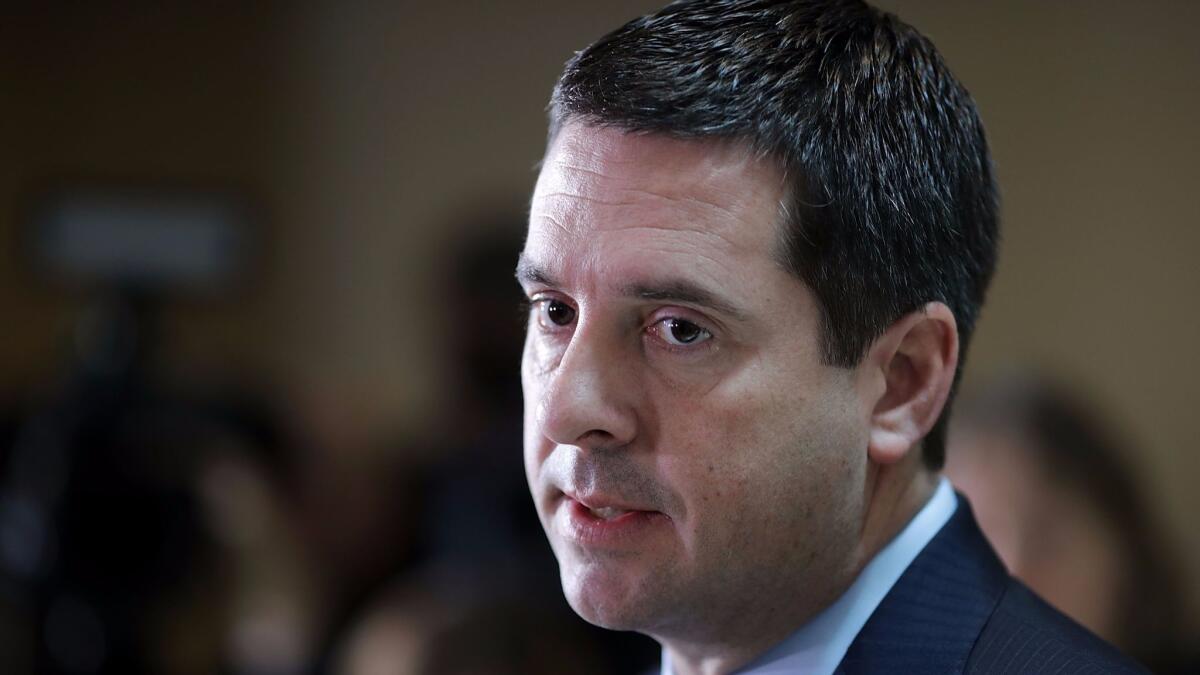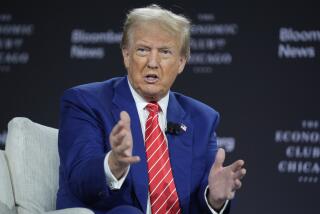FBI director asks Justice Department to publicly reject Trump’s wiretap claim

President Obama denied that he or his staff had authorized any such surveillance. (March 6, 2017)
- Share via
Reporting from Washington — A combative White House refused to back down from President Trump’s unsubstantiated assertion that his predecessor ordered the wiretapping of Trump Tower, demanding a congressional investigation into his claims, even as the director of the FBI took the extraordinary step of asking the Justice Department to publicly repudiate the president’s charge.
The statement Sunday by the White House and the appeal by FBI Director James B. Comey, which was confirmed by a Justice Department official, came on the heels of flat denials from former President Obama that he or his staff had authorized any such surveillance, and from the former director of national intelligence, who said no wiretapping had taken place.
The developments added a bizarre new element to the swirl of intrigue surrounding Russia’s role in the 2016 U.S. presidential election.
The president’s Democratic opponents called the White House’s intimation of wrongdoing by Obama a bid to deflect attention from growing scrutiny of Trump associates’ ties to Russian officials during the campaign. Trump and the Kremlin have called the investigations into Russian influence a “witch hunt.”

At least some Republicans signaled willingness to weigh Trump’s allegation. Rep. Devin Nunes (R-Tulare), the head of the House Intelligence Committee, said in a statement that an existing investigation by his panel would now also encompass “inquiries into whether the government was conducting surveillance activities on any political party’s campaign officials or surrogates.”
Other Republicans expressed more skepticism. If Trump has evidence of wrongdoing by Obama, “it would probably be helpful if he gave more information,” said Sen. Susan Collins of Maine, a member of the Senate Intelligence Committee “But it would also be helpful if he just didn’t comment further and allowed us to do our work.”
The most striking repudiation came from Comey, who privately asked Justice Department officials to issue a statement rebutting Trump’s assertion.
Comey argued that the Justice Department should publicly reject the claim as false because it impugned the integrity of the FBI by raising the specter that agents had broken the law by tapping Trump’s phones.
The Justice Department has taken no action on Comey’s request.
Mike Kortan, an FBI spokesman, and Sarah Isgur Flores, a Justice Department spokeswoman, declined to comment.
Despite Trump’s allegations made on Twitter, the president and his campaign were not targeted in wiretaps, according to current and former U.S. officials. The FBI, however, is investigating Russia’s meddling in the U.S. election and its potential ties to the Trump campaign or Trump associates, U.S. officials have said.
With authorization from the Foreign Intelligence Surveillance Court, the FBI has long been permitted to conduct electronic surveillance on Russian officials, suspected operatives and spies in the United States. It was that surveillance that picked up conversations Trump’s former national security advisor, Michael Flynn, had in December with the Russian ambassador, Sergey Kislyak.
Getting approval from the court to gather electronic surveillance on Trump or his campaign would require a finding by a judge of probable cause to believe either that they were involved in a crime or that they were agents of a foreign power.
James R. Clapper, Obama’s director of national intelligence, said no such warrant was obtained during his tenure to tap the phones of Trump or his campaign. He also said he had no knowledge of evidence that Trump’s campaign colluded with the Russians.
Speaking on NBC’s “Meet the Press,” Clapper said that he would have been in a position to know if any surveillance warrant of Trump’s headquarters had been issued, and that none had been.
“There was no such wiretap activity mounted against the president-elect at the time, as a candidate, or against his campaign,” Clapper said.
There was no such wiretap activity mounted against the president-elect at the time, as a candidate, or against his campaign.
— Former Director of National Intelligence James Clapper
In a statement calling for a congressional inquiry of the former president, White House Press Secretary Sean Spicer cited unspecified but “very troubling” reports of “politically motivated” investigations by Obama’s executive branch, but he did not offer any evidence to back up the claim or say where the reports originated.
The White House statement added that there would be no further comment from Trump or his team on the matter until congressional oversight of Obama’s actions had taken place, a stance that appeared designed not only to forestall opponents’ questions, but also perhaps to head off any further talk — or Twitter commentary — by the president himself.
Trump spent the weekend at his Florida estate, Mar-a-Lago.
His string of tweets on Saturday, alleging wiretapping and personally attacking Obama as a “bad (or sick) guy,” seemed to have caught his own staff flat-footed — a pattern that has occurred frequently in his still-young administration, as aides have struggled to publicly parse unsupported Trump assertions without directly contradicting the president.
On Sunday, Deputy Press Secretary Sarah Huckabee Sanders, under extended questioning by ABC’s Martha Raddatz on “This Week,” seemed at a loss when asked how exactly the president had learned of the purported surveillance.
Essential Washington: Updates on the Trump administration and the rest of Washington »
“I think he’s going off information that he’s seen,” she finally said, without providing any detail. Although he has access to detailed intelligence briefings, Trump is known to be an avid consumer of reports generated by conspiracy-minded websites and talk shows operating outside the journalistic mainstream.
An article published Friday on the Breitbart News website repeated a claim by conservative radio host Mark Levin about surveillance of the Trump campaign, although it is unclear whether the president was responding to that.

Russia’s role in the campaign has been a source of concern and confusion for months, beginning with Trump’s often-expressed affinity for Russian President Vladimir Putin and continuing apace as the president denigrated the NATO alliance, declared he held Putin and close U.S. ally Angela Merkel in equal esteem, and suggested he would consider accepting Russia’s 2014 annexation of the Crimean peninsula.
Questions over whether Trump’s transition team sought to assure Putin that Obama-imposed sanctions would be lifted after the president-elect took office led investigators to pore over phone conversations between Flynn and Ambassador Kislyak.
The national security advisor was forced out last month after only 24 days on the job when it emerged he had misled Vice President Mike Pence about the nature of his discussions with Kislyak.
Russia questions also tripped up Atty. Gen. Jeff Sessions, who during his confirmation hearingssaid he had not met with any Russians. In fact, he had met at least twice with Kislyak in the summer and fall.
Sessions is to provide amended testimony on Monday in writing.
Amid the burgeoning scandal, even Republicans seemed to be hoping the president would not repeat the wiretap claim in such a seemingly offhand fashion.
Sen. Marco Rubio (R-Fla.) said of Trump’s claim: “I’m not sure what it is he is talking about.
“Perhaps the president has information that is not yet available to us or the public,” he said on CNN’s “State of the Nation.” If the allegation is true, “obviously we’re going to find out very quickly, and if it isn’t, then obviously he’ll have to explain what he meant by it.”
Democrats saw an effort by Trump to create a distraction from persistent questions about the Russian role in the campaign. House Minority Leader Nancy Pelosi of San Francisco called Trump the “deflector in chief.”
“You make up something, then you have the press write about it, and then you say, ‘Everybody’s writing about this charge,’” she said, also on CNN. “It’s the tool of an authoritarian.”
Rep. Adam B. Schiff (D-Burbank), a ranking member of the House Intelligence Committee, called Trump’s wiretapping claim baseless — but raised the possibility that looking into it could be a way to widen the door to a wider investigation of Russian involvement.
If the White House wanted answers to questions about alleged surveillance, Schiff said in a statement, Comey should be summoned to “answer any question put to him that is pertinent to the Russia investigation.”
Democrats also signaled they were not ready to let the Sessions’ statements drop despite his agreement to recuse himself from campaign-related investigations. Sen. Al Franken (D-Minn.) said on ABC’s “This Week” that after seemingly making misleading statements to the Senate Judiciary Committee, the attorney general should make a return appearance to “explain himself.”
Sessions has not signaled any willingness to do so.
ALSO
Everything President Trump has tweeted (and what it was about)
Pot festival in Nevada goes forward despite fears of federal crackdown
UPDATES:
5:10 p.m.: This article was updated with information about FBI Director James Comey’s request that the Justice Department repudiate President Trump’s statement.
This article was originally published at 1:05 p.m.
More to Read
Get the L.A. Times Politics newsletter
Deeply reported insights into legislation, politics and policy from Sacramento, Washington and beyond. In your inbox twice per week.
You may occasionally receive promotional content from the Los Angeles Times.











